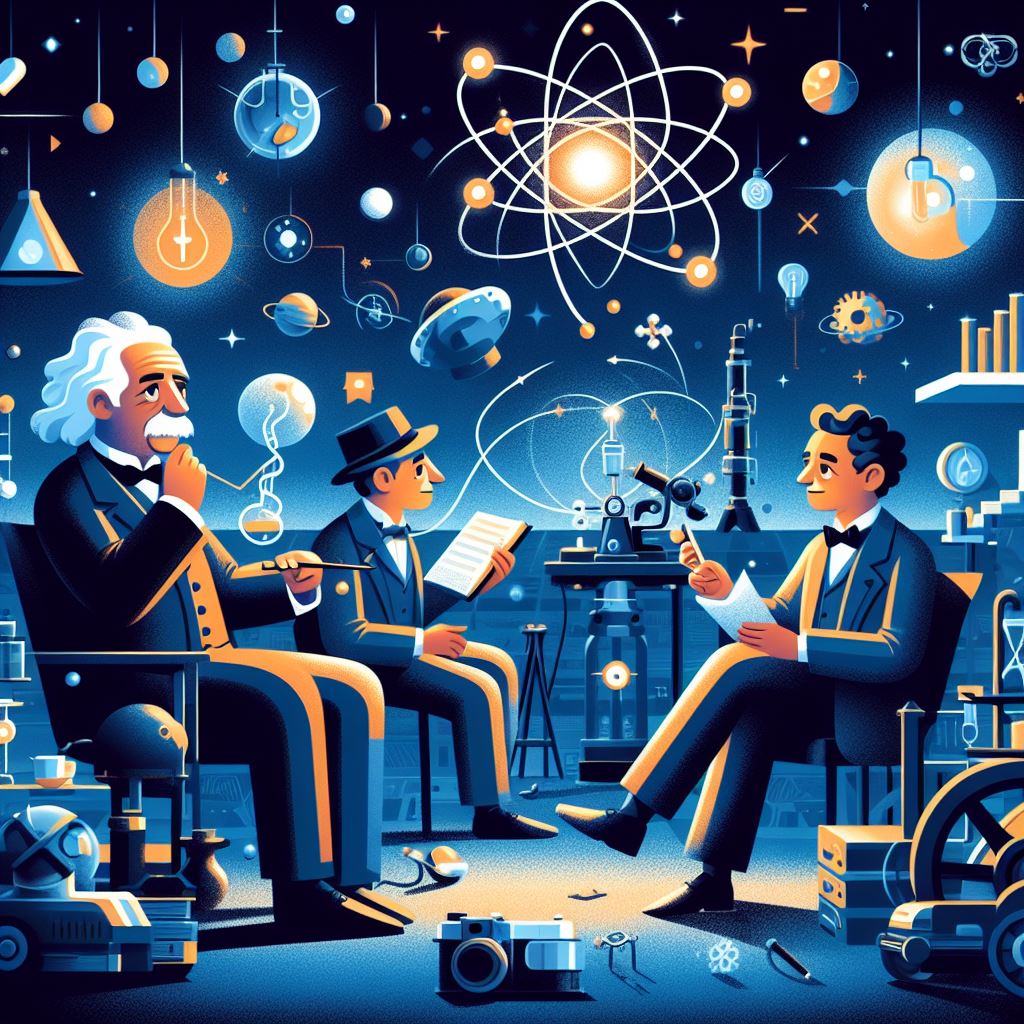Imagine an intellectual gladiatorial
arena where notions of time, space, and
reality itself hung precariously in the
balance. In one corner loomed Einstein,
undulating space-time fabric in hand as he
sought to bend the quantum world to his
will. In the other, Niels Bohr wielded his
quantum sword, ready to immerse physics in
probabilistic wonderland.
So began a
decade-long series of iconic debates that
profoundly shaped our comprehension of
existence. At stake was nothing less than
the soul of modern physics.

Einstein: Seeking Order in Quantum Chaos
Einstein, fresh from unveiling his theory
of relativity, was convinced that certainty
and order reigned supreme. To him, God was
no gambler - the universe operated strictly
by cause and effect. But this tidy
determinism collapsed when confronted with
the bizarre domain of quantum mechanics.
Instead of clear trajectories, you had
only probabilities and uncertainties.
Particles morphed between waves and
particles. Entangled twins seemed to
communicate instantly across vast distances.
It all offended Einstein’s sense of how
nature should operate.
So Einstein
unleashed his genius against quantum theory,
seeking to expose holes that would lead him
to a deeper unified vision. He devised
ingenious thought experiments, like the EPR
paradox, hoping to shatter quantum weirdness
using the power of entanglement itself. If
only he could install order where he saw
chaos.
Bohr: Embracing the Magic of Uncertainty
Meanwhile, Bohr became enchanted by
the endless possibilities of quantum
uncertainty. To him, the Copenhagen
Interpretation - with its probabilistic
playfulness - seemed a perfect encapsulation
of reality’s true nature. Particles jiggled
in quantum superposition until pinned down
by measurement. Complementarity and
wave-particle duality flowed naturally from
this worldview.
So while Einstein
tried to pen reality into a single equation,
Bohr celebrated the complementary facets of
nature that could never be simultaneously
grasped. Certainty might appeal to minds
craving answers, argued Bohr, but
uncertainty unlocks the true magic, the
great quantum circus!
Of course,
Bohr still had to render his philosophy
mathematically consistent. But with
brilliant minds like Heisenberg,
Schrödinger, Pauli and Born fleshing out the
equations, the Copenhagen spell grew only
stronger.
A Clash of Titans Unfolding
Like boxers trading blows, Einstein and
Bohr sparred through thought experiments and
heartfelt pleas, trying to bring the other
round to their view. Their first bout
occurred at the 1927 Solvay Conference,
where new quantum formalisms clashed
fiercely with Einstein’s realism.
At
the epic 1930 Solvay Conference, Einstein
landed forceful counterpunches by
highlighting seeming inconsistencies between
quantum mechanics and relativity. Bohr
absorbed the blows, retreating to ponder
Einstein’s latest salvo - a sophisticated
argument around a photon box that stumped
even born quantum magicians like Pauli.
But Bohr later returned the favor,
neutralizing Einstein’s attack after days of
intense focus. More debates and more
inconclusive punches followed for much of
the decade.
The one-two punch
legendary philosopher Bertrand Russell
called “a duel between Bohr and Einstein”
transformed into less a sporting match than
an impassioned philosophical struggle bound
by a deep mutual respect. Neither landed a
knockout blow, though Bohr emerged battered
but standing.
Legacy of a Friendly Rivalry
Some argue that in his later years,
Einstein partially conceded defeat,
admitting that for the moment he could not
refute Bohr's interpretation of quantum
theory. However, Einstein never abandoned
the search for a unified theory merging
relativity and quantum principles. Questions
raised during his friendly rivalry with Bohr
continue inspiring physicists today.
Just as Bohr predicted, quantum
uncertaintly reigns supreme, driving rapid
technological progress. And yet Einstein's
instinctive discomfort with probability
lives on among those seeking deeper truths.
His quest to explain entanglement inspires
exotic experiments even now.
Meanwhile, the cosmological constant
Einstein invented and later rejected plants
the seeds for dark energy theories. Bohrian
whimsy gave rise to quantum field theory
advancements. And the great ensemble
dialogue Einstein and Bohr recited so
passionately points the way forward.
Their healthy clash represents science at
its heart - an eternal debate, conflict as
the crucible for progress. As instruments
probe stranger domains, we see further
vindication: uncertainty appears central to
existence. But so too does order arise from
entropy when new discoveries beckon.
Just as light possesses both wave and
particle characters, our understanding
unfolds through paradox. Reality manifests
in complementary ways waiting to be parsed
and unified.
As inheritors of
Einstein and Bohr’s rich legacy, our task is
clear: to pick up where these luminaries
left off and carry forth the great
scientific debate as our knowledge expands.